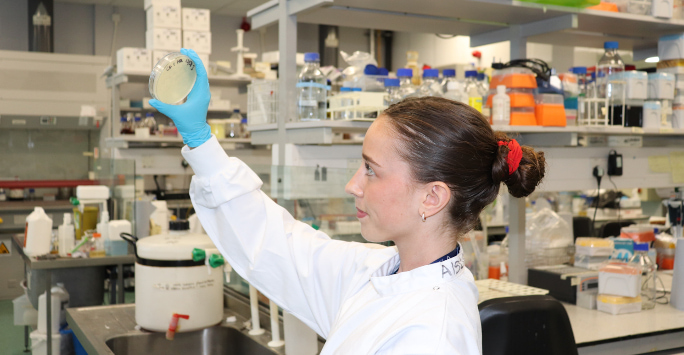
Holly Richardson is a third-year undergraduate student from the School of Biosciences. This summer she spent 8 weeks on a Microbiology Society Harry Smith Vacation Studentship in the Hinton Lab. Here she tells us about the highlights.
Background
Invasive non-typhoidal Salmonella (iNTS) have become a leading cause of bloodstream infection across sub-Saharan Africa. With antimicrobial drug resistance threatening to further compromise patients outcomes, the use of bacteriophages (phages) as a therapeutic could be a solution. To gain a broader acceptance of phages as therapeutic agents, we need a deeper understanding of interactions between bacteria and phages.
Project aims
Currently, there is a knowledge gap regarding bacteriophage interactions with iNTS. The primary objective of this project was to gain insights into the distinct surface receptors used by phages to infect S. Enteritidis, a serovar responsible for one third of iNTS infections in Africa. These findings hold practical relevance in the battle against bacteria-phage resistance. By knowing which surface receptors are used by individual phages, a phage cocktail strategy could be developed to combat resistance.
My research
For my main project I investigated strains that were resistant to phage infection, to understand the adaptations these strains had developed. The process involved a series of infection experiments where I exposed S. Enteritidis to a selection of iNTS-infecting phages, ultimately collecting the resistant colonies that survived. I then performed phage spot assays in order to validate the resistance phenotype.
To identify how the bacterial strains had achieved resistance at a molecular level, I extracted genomic DNA and analysed genome sequences.
In addition to my primary research project, I also isolated novel phages capable of infecting iNTS from a water sample I collected. This was a tremendous achievement for me as the new phages will be the focus of future work in the Hinton lab.
Outside the lab
As well as carrying out my lab work over the summer, my studentship also provided me with many other exciting opportunities. Being part of a research group, I attended weekly lab meetings where we discussed the latest research findings. I attended seminars from external speakers, and talked to new colleagues who are pursuing a PhD – an ambition of my own.
A highlight of the summer was meeting a delegation from the Microbiology Society and at the end of the summer, I was able to present my research to the group’s weekly lab meeting.
Future plans
This project has reinforced my belief in my goal of pursuing a PhD. Having been surrounded by graduate students and postdocs during my placement, I have been inspired by their passion for research and have received helpful and honest advice to pursue a PhD myself. Gaining extensive lab experience through this project has made me more confident that pursuing a PhD is a realistic goal for me. Working independently in a lab for the first time has significantly increased my confidence and has given me greater insight of what it is like to work in a research environment.
Additionally, by managing to isolate novel phages that could be included in later publications, the project gave me a great sense of achievement. I know that co-authorship on a research publication would place me in a competitive position to succeed with a PhD application.
During my time in Lab H, I was supervised by Aisling Brady, a postdoctoral researcher, who was incredibly supportive and a great mentor. I was fortunate to receive remarkable teaching in lab skills, which I believe that will help me to excel in my early career path, and puts me in a strong position for applying for a wet lab-based PhD. In summary, it’s been a great opportunity that I’ve thoroughly enjoyed!